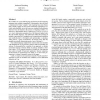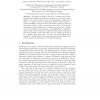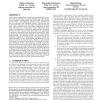636 search results - page 67 / 128 » Operational Semantics for Functional Logic Languages |
186
Voted
TLDI
2010
ACM
15 years 11 months ago
2010
ACM
ML modules are a powerful language mechanism for decomposing programs into reusable components. Unfortunately, they also have a reputation for being “complex” and requiring fa...
226
Voted
POPL
2006
ACM
16 years 3 months ago
2006
ACM
Functional programmers often reason about programs as if they were written in a total language, expecting the results to carry over to non-total (partial) languages. We justify su...
140
Voted
ICALP
1998
Springer
15 years 7 months ago
1998
Springer
This paper investigates the use of a complete metric space framework for providing denotational semantics to a real-time process algebra. The study is carried out in a non-interlea...
162
Voted
FDL
2004
IEEE
15 years 6 months ago
2004
IEEE
System-on-Chip (SOC) and other complex distributed hardware/software systems contain heterogeneous components such as DSPs, micro-controllers, application specific logic etc., whi...
144
Voted
CORR
2010
Springer
15 years 2 months ago
2010
Springer
Event-driven automation of reactive functionalities for complex event processing is an urgent need in today's distributed service-oriented architectures and Web-based event-d...



